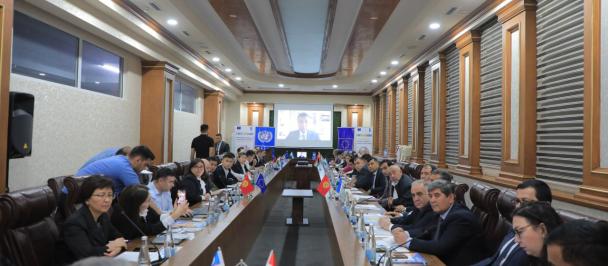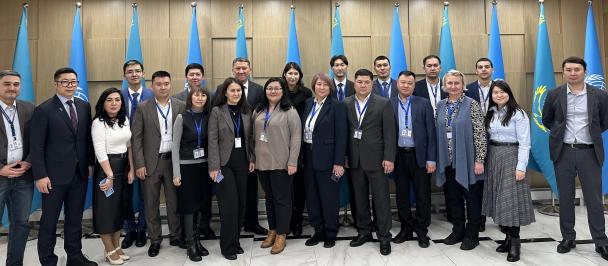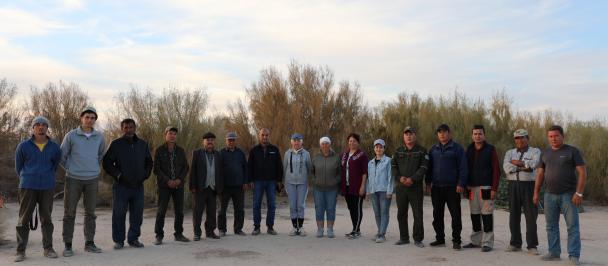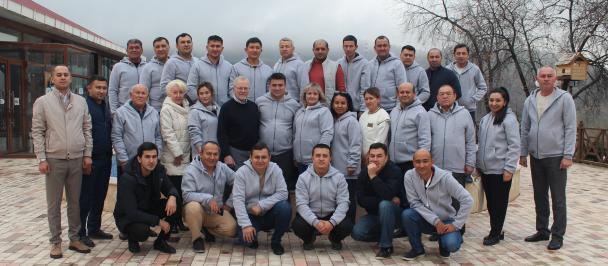CLIMATE CHANGE CAN NEGATIVELY IMPACT VULNERABLE CATEGORIES OF WOMEN
October 12, 2022

Today, many studies show that climate change disproportionately affects women's and men’s health. Improving the lives of rural women is key to fighting poverty and hunger. Giving women the same opportunities as men could increase agricultural production by 2.5 to 4 percent in the poorest regions, and the number of malnourished people could be reduced by 12 to 17 percent.
In 2022, International Day for Rural Women will be celebrated under the theme "Rural women cultivating good food for all", to recognize the work of these heroines in the food systems of the world, and let's claim rural areas with equal opportunities for all.
UNDP Uzbekistan is celebrating International Day together with the women of Ferghana Valley in Namangan region on October 12 together with the Center for Hydrometeorological Service (Uzhydromet). Over 25 women and men specialists from the region gathered for a roundtable on mainstreaming gender aspects in the development and implementation of climate policy in the framework of the joint UNDP and Uzhydromet project, with the financial support of the EU "Climate Change and Resilience in Central Asia".
The impact of climate change disproportionately affects the most vulnerable categories of women—the disabled, migrants, the elderly, and those living in rural areas. UNDP is committed to solving this issue and organized the roundtable with the aim of discussing the results of the survey on mainstreaming and sustainability of gender aspects in climate policy and bringing the best international experience practices. Another goal of the event is to discuss the Draft Roadmap on gender-sensitive climate policy that will significantly mitigate the impact of climate change on vulnerable categories of women.
The experts highlighted that both women and men working in natural resource sectors, such as agriculture, hydrometeorological services, environmental protection agencies, etc., are likely to be affected by climate change. However, its impact on gender is not the same.

Women are increasingly being seen as more vulnerable than men to the impacts of climate change, mainly because, worldwide, women have less access than men to resources such as land, credit, agricultural inputs, decision-making structures, technology, training, and extension services that would enhance their capacity to adapt to climate change. Women's vulnerability to climate change stems from a number of factors-social, economic, and cultural.
In spite of their vulnerability, women are not only seen as victims of climate change, but they can also be seen as active and effective agents and promoters of adaptation and mitigation measures. For a long time, women have historically developed knowledge and skills related to water harvesting and storage, food preservation and rationing, and natural resource management. This knowledge and experience that has passed from one generation to another will be able to contribute effectively to enhancing local adaptive capacity and sustaining a community's livelihood.
Adaptation initiatives should identify and address gender-specific impacts of climate change, particularly in areas related to water, food security, agriculture, energy, health, disaster management, and conflict. Important gender issues associated with climate change adaptation, such as inequalities in access to resources, including credit, extension and training services, information and technology, should also be taken into consideration. Women's priorities and needs must be reflected in development planning and funding. Women should be part of the decision-making at national and local levels regarding the allocation of resources for climate change initiatives.

Consequently, the participants noted that it is essential to increase the representation of women in relevant climate policy structures and introduce gender indicators to assess the gender sensitivity of climate policy. At the end of the event, the Draft Roadmap on gender-sensitive climate policy and gender indicators was presented to the participants. They shared their views and commented on aspects that should be prioritized in order to mitigate the impact of climate change on vulnerable categories of women.
_______
For information. The scale of expected climate change and its implications for the national income and employment, water and agriculture sectors are among the most vulnerable in the country. To solve these problems, UNDP, together with Uzhydromet, with the support of the EU, is implementing the project "Climate Change and Resilience in Central Asia". The project is aimed at maintaining stability and climate-resilient development in the Ferghana Valley and in the bordering areas of the Kyrgyz Republic and the Republic of Tajikistan. One of the objectives of the project within SDG 13 is to promote capacity-building mechanisms for effective climate change planning and management in developing countries, with a particular focus on women, youth, and local and marginalized communities.

 Locations
Locations



